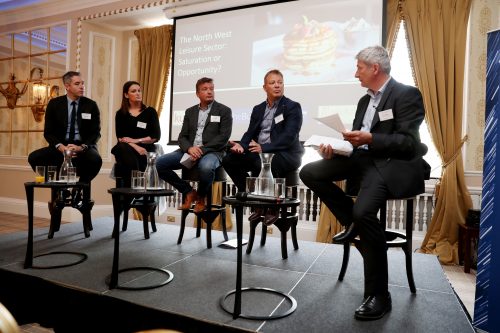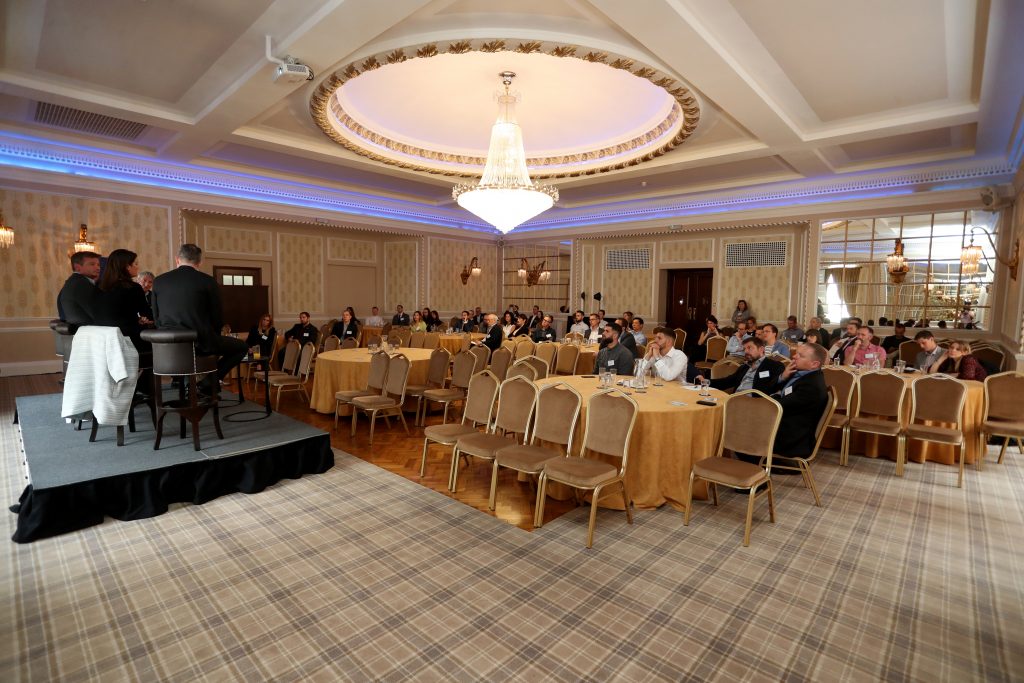Manchester has a secret weapon when it comes to staying ahead of its rivals

Manchester has a major advantage over rival cities when it comes to its night time economy – according to an influential lawyer.
The North West capital is the only city in the UK which does not have a policy limiting the number of bars and restaurants allowed to operate.
The revelation was made in a panel organised by TheBusinessDesk,Com in partnership with law firm Kuits.
The panel was held at the Manchester Hall and took a close look at the leisure sector in Manchester and the North West.
The four speakers at the event were Stephen Cliff from Manchester Hall, Simon Potts from The Alchemist, Felicity Tulloch from Kuits and Dan Davies from Metis.
A gallery of pictures from the event can be found here.
The panel tackled a wide range of issues from social media to the problems facing new operators.
The first subject under discussion was whether the bar and restaurant in Manchester is over-saturated.
Dan Davies said: “From my perspective as a landlord I am aware that landlords in the leisure market are having to give good incentives for tenants to take venues that they have either refurbished or in the process of building at the moment.
“It does depend on where that offer is and what is around it. So if we use this building as an example the leisure side of Manchester has shifted around here, to the Spinningfields location which has been very fortunate for us.
“We have got tenants moving into this building all of which are completing their leases over the next two weeks.
“From my perspective there has been interesting discussions with those tenants on the deals. Thankfully we held out on the basis that we knew that this is a good venue and a good location. The tenants want to move to the best locations.
“We have got three tenants who could have found ways to pull out of the deal if they wanted to but were more than happy to sign up to the lease.
“Speaking from an operational point of view Masons restaurant opened in the building in November. It has gone through the kind of start you would expect, it hasn’t been doing as well as we would have liked.
“But because of the location and because people are aware of it, trade is increasing. From the landlord side we are noticing that there is still good interest from restaurant operators and they are prepared to run at sensible deals in terms of rent.”
Dan Davies added: “There are some specifics about Manchester, the downturn in the casual dining market started last year, at the start of 2017. We have had a very tough time of it from a landlords’ perspective.
“The demand from the big national chains pretty much dried up around three years ago in Manchester because there were so many schemes that were being developed and demand was being taken up.
“I don’t think there is saturation in Manchester, I just think there is a natural evolvement of what is going on.
“We have as much interest in the city now as we had in the boom period of 2015 and 16. However, its not coming from the big national chains, it is actually quite a lot of regional independent operators.
“Don’t forget that for every failing business there has been, of which there has been quite a few in the last 18 months, that provides opportunities for the independent operators who are coming through.
“And we are getting those quirkier operators from London who are starting to have a look at Manchester and starting to see either an amazing space such as here or something that is already fitted out which will save them quite a lot of money.”
Simon Potts was asked about the importance of location in building a business.
He said: “I think location is important, generally what comes with premium locations is premium rentals.
“Richard Carey at The Ivy is expanding rapidly and will go to any city and take the premium spot and pay whatever the going rate is just to make sure he has got those numbers coming through the door.
“You have to be destinational. If I were to use the New York Street site as an example. It’s towards Piccadilly so its deemed to be the less salubrious end of the market in Manchester but its on a fantastic walkway down to the station, added to that we have got a brand that people understand.
“It has got great frontage, there is a business community round there. You have got the Village down the road and you have the Northern Quarter not so far away.
“So what on paper might not look too strong in terms of a location is actually doing really well for us.”
Dan Davies was asked what set Manchester apart from other cities.
He said: “We have an awful lot of operations within the city, it is quite clear to me that what works in the city is an operator who has taken the time to understand it.
“There is a slightly parochial view that London brands don’t work in Manchester. I think that’s wrong, most people here have probably eaten at Hawksmoor and would agree it is one of the better restaurants in the city.
“That is a case of an operator taking the time to actually get underneath the skin and fully understand what it is that makes Mancunians tick.
“As a city centre we are second or third in the country in terms of a destination. I don’t buy into the line that we desperately need a Michelin Star to put us on the map.
“It would be a lovely thing to have, but it is a hard thing to get and it is a hard thing to operate as well.
“What we have is a really good diverse offering. It is very interesting for me to note that a lot of the mainstream cookie cutter casual dining brands are really struggling in Manchester. More so than they are in other southern cities.”
Simon Potts added: “One of the things that people forget about Manchester is that although the night time economy has always been strong and is in part what makes the city tick is the issues with the weekly trade.
“One of the key differences here is that with the weekly trade with people going out shopping you lose an awful lot of traffic out to the Trafford Centre. It is open to 10 or 11 o’clock at night.
“That’s the Monday to Thursday spend during the day. London has that trade, people who are out shopping and stopping for something to eat and drink.
“It doesn’t exist in the same way in Manchester. Manchester is actually quite a quiet city centre in terms of its shopping offer.
“The Corn Exchange is a good example of that. A big scheme that opened, a dozen or so restaurants with comparable offerings.
“National brands coming to what would be perceived to be the central space in the city and it didn’t really translate because there just isn’t the weight of numbers that you would get in a comparable place in London.
“Dan made the point about Hawksmoor. A great quality operator who took a lot of time to get to know the city, who knew exactly what they were going to be dealing with when they came up.
“It took six months of guys coming up and working in Manchester, six months of the Manchester guys going down to London to understand the offering.
“They worked really hard before they put people into the space. I assume they have done the same thing at Manchester Hall.
“I think conversely people like Red Lobster, they came to Manchester and took these huge spaces on and expected to replicate what they had done in London and it just didn’t translate. They didn’t get the weight of numbers.”
Felicity Tulloch then spoke about local authority policies.
She said: “Manchester is unique in the country in that it doesn’t have what is known as a cumulative impact policy. Every other city does and so do large towns and even smaller market towns.
“The policy means that there is a presumption against granting new licenses. Manchester doesn’t have one which makes the city more attractive to operators in the city and from London.
“That is not to say that getting licenses is easy in Manchester but there isn’t that additional hurdle that operators come up against in other parts of the country.
“Peter Street is a good example in Manchester. A few years ago it was the place to have your night out but for a few reasons it wasn’t the greatest part of the city.

The Businessdesk leisure industry panel
“But I think the council let nature take its course. A number of operators failed but what the council could have done when the situation was at its peak was introduce a policy.
“It could have identified it as a problem area and say right that’s it, no more bars and restaurants in this location.
“But all that would have done was when those bars failed was prevent new operators coming into the area.
“Often these policies are not always the best solution for a city when its looking to shape its night time economy.
“The policy is always under review, a few years ago before the downturn the Northern Quarter was close to getting a cumulative impact policy.
“There is one in Fallowfield because of its student population and the noise issues that that can cause.
“The council earlier this year has consulted on a similar sort of policy for Ancoats and in the New Islington area.”
Stephen Cliff was asked about the differences between Manchester and other UK cities. He said: “Just because something works in London it doesn’t necessarily mean it is going to work in Manchester.
“There are examples of that but there are also examples of brands coming here and doing their homework.
“Dishoom are coming in December and they started their recruitment six months ago and they are employing local people.
“They are investing time and money into understanding the Manchester market. It should work out because they are putting that time effort and expense into the restaurant.
“Just coming and opening a restaurant with a name in a location that people would not expect to go to, doesn’t work within Manchester.”
He added: “People in Manchester expect value for money. That doesn’t necessarily mean cheap. People might have a meal and say OK it wasn’t exactly cheap, but I really enjoyed it and it was value for money.
“That’s one of the reasons why Michelin starred restaurants haven’t worked so well, because they are aspiring to be Michelin therefore the prices are at a higher level.
“The quality of the food is good, but the quantity is not what you are getting compared to other restaurants.”
Dan Davies added: “If you are trying to curate a scheme it is very easy to try and get best in class but ultimately there is a lot of economic pressures that will come into play. Circumstances also come into play.
“We work in Fir Street in Manchester, I think in terms of what is in there now. Its got a really nice mix. There are lots of independents, but it is underpinned by a couple of quality mainstream operators.
“It has become a district within the city centre.
“When we started marketing that, if the offers had come in from the big chains it would have a very brave commercial operator to turn those down. What you have got now is a far better product.
“Sometimes you can afford to make choices and sometimes it is just the way things work out, Fir Street is a great example of that.
Felicity Tulloch added: “We have done a lot of work with developers getting into developments before they are even built to get licenses in principle. That means units are more attractive when it comes to marketing them to tenants.”
Simon Potts said: “Taking some of the pain and challenge out of the opening schedule has to be welcomed. From identifying a site to getting the doors open, it is 12 months minimum.
“That can take even longer depending on what sort of licence you are applying for or what sort of objections there are.”
Dan Davies added: “We work hard to make sure we have schemes oven ready for developers, but we also want to get the mix right.
“We want something to be working in ten years’ time, we want it to be a place where people will continue to go to.”
Stephen Cliff addressed the issue of staying ahead of rivals.
He said: “We are helped by the building but from my experience as a landlord and as an operator it is all very well coming up with the original concept but then you have to think about how you change and evolve after you are open for business.
“There is a cycle and unless there is something new in your venue people do tend to get a bit bored and go to the next one.”
Simon Potts added: “We have had the site in Spinningfields for some time and it has served us well but there are other people coming into the area.
“That means that we cannot relax and we need to keep the venue refreshed.”
Dan Davies talked about the challenges facing new businesses.
He said: “The biggest issue is money. For a restaurant operator to open a 3,000 sq ft site that’s going to between £500,000 and a £1m.
“You maybe the most innovative operator out there and have a real passion for your business but you still need backing.
“It is a big call to give up a well-paid job and get into debt to follow you passion, that is without a doubt the biggest hurdle.
“If you have a track record now is the time to go for it. It is very much a good operator’s market. There are some big landlord incentives for the right type of space.
“For every downturn there is good to come out of it, the door opens for the independent to get a foothold.
“If you look at what has changed in the market it is the customers’ interest in food.
“You are also seeing the introduction of food halls such as Altrincham market, that is a great way for a lot of these operators to get started at a fraction of the price.
“It still has to be a passion and you have to be very good at what you are doing.”
Stephen Cliff talked about the importance of social media.
He said: “Masons Restaurant was my first venture into a restaurant. We are in the right location and venue and done a good job on the fit out.
“It ticks all of the boxes but trying to get people to chose to come to our venue is a challenge.
“I thought you could just picture of your food on social media and people would come along but you need to be much cleverer than that.
“We can target people who like going out in Spinningfields through paid social, it has been a learning curve it is much more than just posting pretty pictures.
“That comes at a cost but as long as the cost comes at a benefit in terms of people coming through your door then it is a sensible way forward.”
Simon Potts added: “We use social media in two ways, we are a national brand and our social media is done at a national level. That allows us to have a tone of voice and talk to our consumers in a natural way. If you do it well then you get customer loyalty.
“At a local level we use social media at a community level to push local offers and to target customers. It takes managing but it is now fundamental to any good business.”








